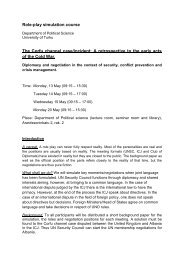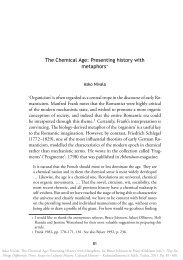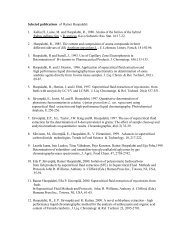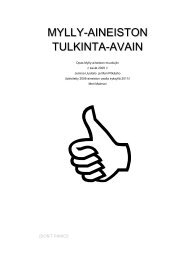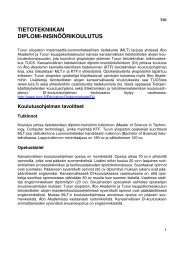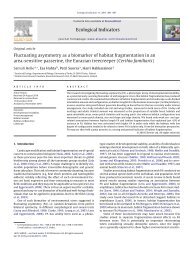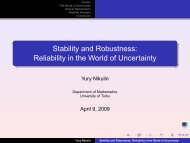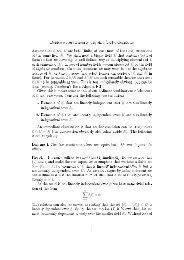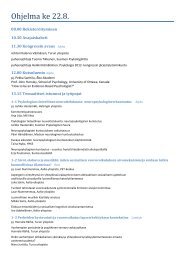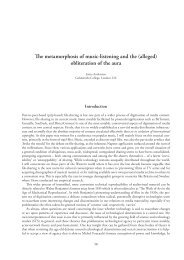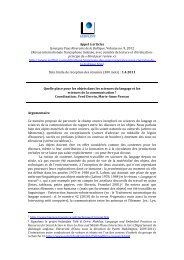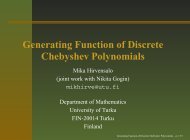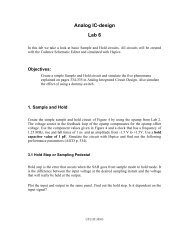The Chemical Age: Presenting history with metaphors∗
The Chemical Age: Presenting history with metaphors∗
The Chemical Age: Presenting history with metaphors∗
You also want an ePaper? Increase the reach of your titles
YUMPU automatically turns print PDFs into web optimized ePapers that Google loves.
<strong>The</strong> <strong>Chemical</strong> <strong>Age</strong>Faust’s servant Wagner fabricates an alchemic Homunculus who is anartificial man living in a test tube. Another telling example is Frankenstein(1818) by Mary Shelley, where a secret, apparently electrochemical process,brings an artificial creature to life. In contrast to the more optimisticSchlegel, both Faust and Frankenstein connect the chemical nature ofmodern culture <strong>with</strong> dystopian fears aroused by the Industrial Revolution.Concepts and metaphors are always historical. Schlegel was consciousof the problem of linguistic historical modeling. He thought that thecognitive fields of <strong>history</strong> and language overlapped. 42 When Schlegeldescribed <strong>history</strong> according to the metaphor of chemistry, he also assignedto his concept of fragment a historico-philosophical meaning. That is, theinterpretation of the modern epoch as a fragmentary era meant that hiscontemporary era was the age of mere tendencies. Schlegel explained theconcept of tendency in a following way: ‘in the dialect of the “Fragments”,the word would mean that everything is still only tendency, that this ageis the age of tendencies.’ 43Through the concept of tendency Schlegel claimed that the modern ageis not a straightforward repetition of former eras. How is it possible thatcompletely new cultural compounds are mixed from the elements that areinherited from previous cultures? Although Schlegel thought that there arecultural and historical conditions framing human action, he did not thinkthat those conditions necessarily determine it. <strong>The</strong> difference betweenorganic and chemical metaphors is that former implied a cyclical modelof natural repetition. Furthermore, the biological preformation theoryimplied that <strong>history</strong> consisted of the imitation of pre-conceived forms. 44But according to Schlegel, modern <strong>history</strong> is not pre-determined. It is amovement to an open future. <strong>The</strong>refore modern <strong>history</strong> is not an organic(that is, teleological) process although it may become so in the future.42 See KFSA XIV, p. 6.43 Schlegel [1800] 1997, p. 122; KFSA II, p. 367.44 According to Hans Dietrich Irmscher, the background for Herder’s organic metaphorswas the debate between preformation and epigenesis theories. <strong>The</strong> epigenetic interpretationof <strong>history</strong> means that it tends to produce more and more complicated formsby dividing itself into divergent cultural forms. It is a movement from original naturalunity to modern fragmentation. Irmscher 2001, pp. 109–110. Cf. Kapitza 1968, pp.23–24. See also Turunen 2006 (for English summary see p. 541).Asko Nivala: <strong>The</strong> <strong>Chemical</strong> <strong>Age</strong>: <strong>Presenting</strong> History <strong>with</strong> Metaphors. In: Bruce Johnson & Harri Kiiskinen (eds.): <strong>The</strong>y DoThings Differently <strong>The</strong>re. Essays on Cultural History. Cultural History – Kulttuurihistoria 9. k&h, Turku, 2011. Pp. 81–108.93




